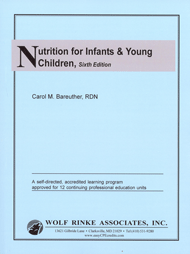|
This activity
will help you to:
- assess common feeding problems and describe solutions
- evaluate nutritional status of infants and young children
- identify and evaluate growth and developmental patterns
- calculate protein, calorie and fluid requirements
- describe optimal dietary management for special needs
Share with a friend and Save! Click here for important information about
sharing.
To order an ADDITIONAL Reporting Form click below:
C311F |
12 CPEUs |
REPORTING FORM |
Currently out of stock.
New inventory coming soon. |
|
Nutrition for Infants &
Young Children, Sixth Edition
© 2024 Wolf Rinke Associates. All rights reserved for this self-directed accredited learning activity. Reproduction in whole or part without written permission, except for brief excerpts, is prohibited.
Goal and Objectives
GOAL
To provide you with practical information that will enable you to deliver appropriate nutritional care to infants and young children.
OBJECTIVES
By studying and applying the concepts presented in this CPE program, you will be able to:
- Identify normal growth and development patterns in infants and young children.
- Evaluate the infant’s physiological development for the metabolism of carbohydrates, fats and proteins.
- Calculate protein, calorie and fluid requirements for infants and young children.
- Explain the advantages of breast-feeding.
- Select an appropriate infant formula based on an infant’s age and state of health.
- Calculate the calorie and protein content of infant formulas.
- Explain the order in which foods should be introduced to infants during their first year.
- Evaluate problem nutrients in the diets of young children.
- Assess common feeding problems in young children and describe their solutions.
- Provide successful tips for feeding hospitalized children.
- Evaluate the nutritional status of infants and young children by assessing anthropometric, biochemical, clinical and dietary intake data.
- Explain nutritional problems specific to infants and children with acquired immunodeficiency disease (AIDS).
- Recognize the foods most likely to cause food allergies in infants and young children.
- Explain the characteristics of foods most likely to cause dental caries.
- Assess nutritional problems of infants and young children who are developmentally delayed and describe their solutions.
- Suggest the optimal dietary management for infants and young children who have type 1 or juvenile-onset diabetes mellitus.
- Suggest dietary treatments for diarrhea and constipation in infants and young children.
- Explain dietary factors that can affect children’s behavior.
- Recommend enteral and parenteral nutrition support for infants and young children.
- Assess potential nutrient deficiencies in infants and young children consuming vegan diets.
Return to the top of page
If you prefer to order by phone, mail
or fax click below
or click here to contact us with
other questions.
For information about our other products and
services return to the sidebar at the top of the page.
|

